About Town of Biscoe
Our Mission
To provide efficient and effective
local government services to the citizens of the
Town of Biscoe and Montgomery County.
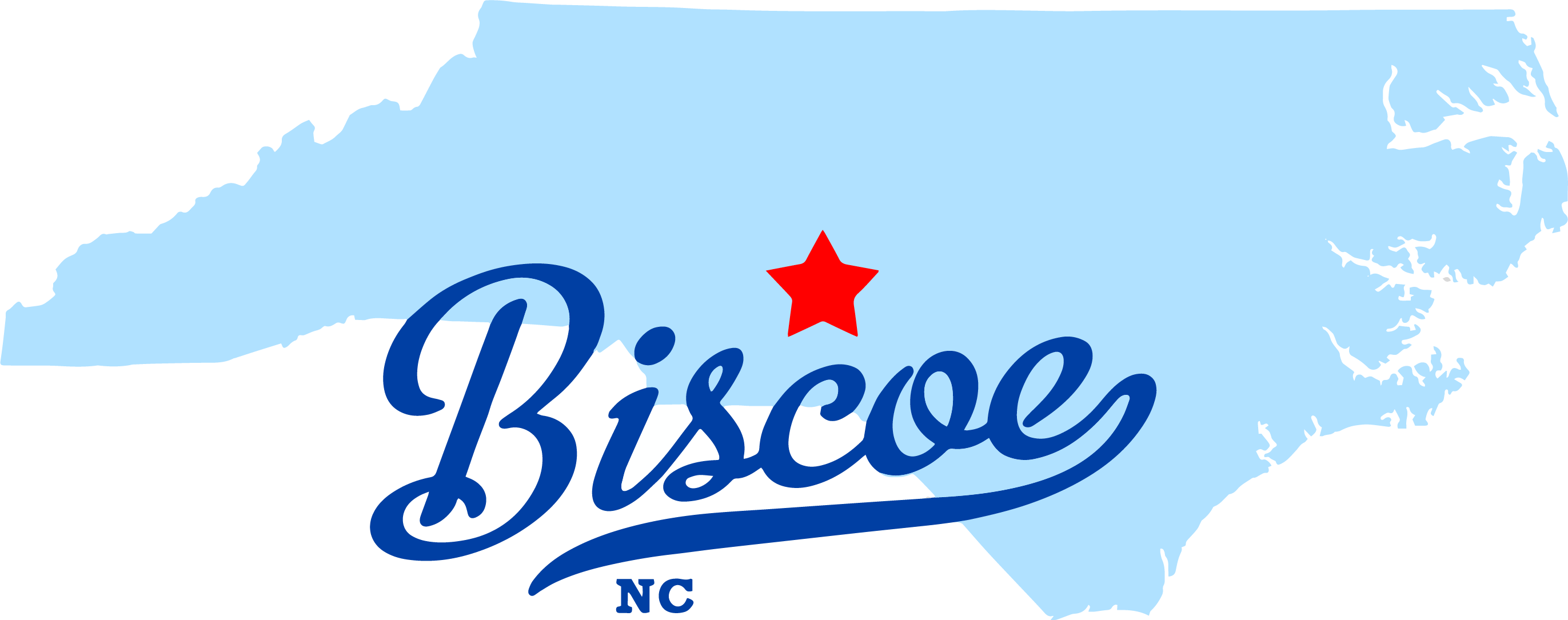
a dream worth dreaming…
Located in the Heart of NC, 3 miles South of the Geographic Center of the State, the Town
of Biscoe represents everything that is good about this great State. Whether your traveling
to the beaches or the mountains, Biscoe is your midway point to Everywhere.
Local Government is the government closest to the people, and with that responsibility,
comes a great deal of respect for our citizens. This year, the Town of Biscoe has 1,754
citizens and Your Board of Commissioners is working hard to represent all of you. If you
have any questions or concerns, do not hesitate to come to Town Hall and speak with a
member of our staff. We are here to protect Biscoe and all 1,754 citizens that make Biscoe
a Great place to live, work, and call HOME.
Our Mission
Once a Railroad Town
Throughout the late 1800s, the
Town of Biscoe was known as Filo.
Located on the east side of the county,
Biscoe was in its early days a railroad town.
Town of Biscoe was known as Filo.
Located on the east side of the county,
Biscoe was in its early days a railroad town.
History indicates that the Page family
owned a lumber yard in the community of
Filo. One of their major customers was a
commission merchant in Philadelphia – one
Major Henry Biscoe. In 1895, the name of
the community was changed to Biscoe to
honor him. Since it was incorporated in 1901,
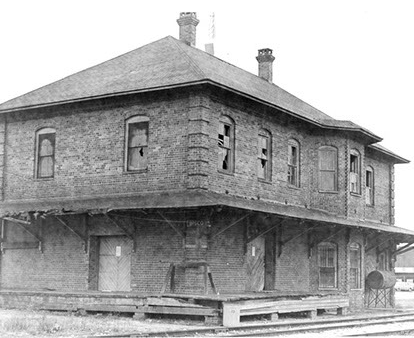
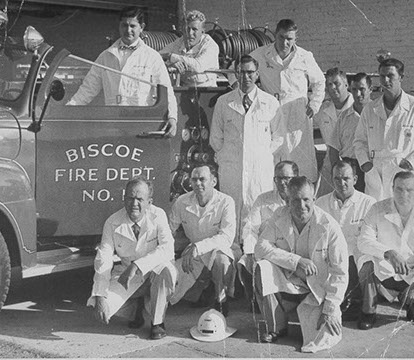
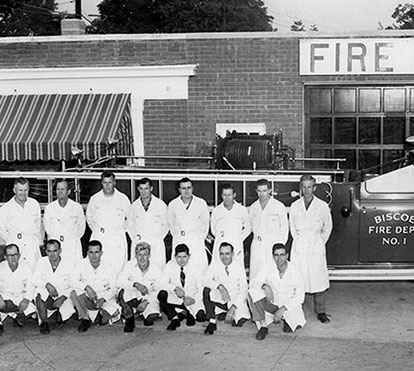
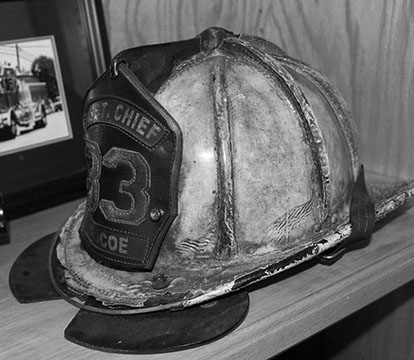
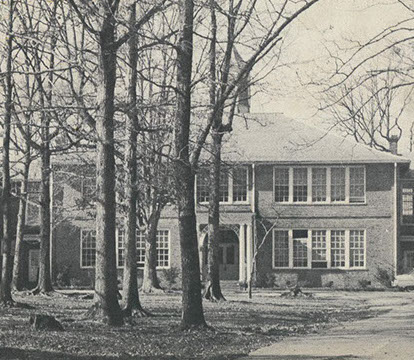
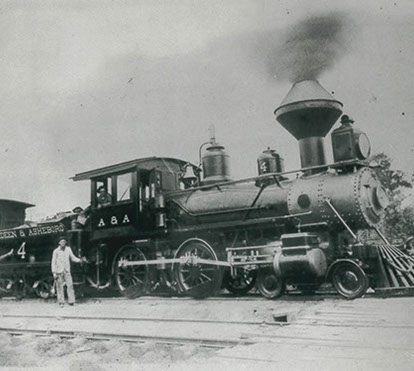
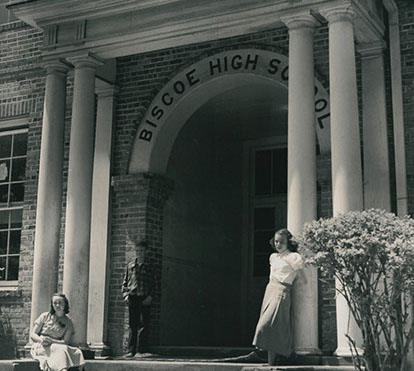
a lot of things have changed in Biscoe, most notably the disappearance of the
railroad. At one time, the town was designated as the headquarters for repairs on all train
operations west of Raleigh. The operation employed about 100 people. Four passenger
trains and six freight trains operated out of the station daily.
A lot of Biscoe’s current industry grew up from the railroad. “At one time they built
railroad cars here and made them from scratch,” said David Monroe. There has been an
iron foundry here from way back. I started The Foundry that is still in operation. “I started
working in a foundry when I was in school, during the summers,” he continued. “I got
hooked on the trade. Biscoe is known for its skill in iron works. There have always been
gifted people who can do machine work here – like the Kellams.”
For Red Sedberry, one of the things that has changed the most has been the view from his
corner of town. Sedberry has operated the Pure Oil (later a Union 76) at the intersection of
Old US 220 and N.C. 24/27 since March, 1955.
“Several years ago, this was the gathering place for the working men,” recalled Sedberry.
“When they would get off work they would stop by and tell jokes and talk a while before
heading home. Sometimes there would be 10 or 15 people here.” From his office, Sedberry
pointed out changes in the town. “Old Jack’s building was across the way, then further
down was the Old South Inn. Across the street was another Exxon station and on the other
corner was a bid tic yard,” he recalled. “The hotel was where the clinic now stands,” he said.
“There was a big persimmon tree between the hotel and the Exxon. It’s gone too.”
Sedberry recalled that the old depot was on Main Street. “There was a roundhouse there
too, where they would turn the trains around to work on them,” he said. “I hated when
they tore down the depot. That should have been preserved. It was a landmark. We’ve
already removed a lot but haven’t managed to put anything back.”
Sedberry loves his town, and he has served on the town board for the past 10 years. “I’ve
enjoyed that,” he said. “Sometimes it has been kind of tough because you have to do
some things that aren’t really popular, but we always try to do whats best for our town.”
Just across the street from Sedberry’s gas station, Ingram Jenkins operated the same drug
store that his father, Walter Jenkins, opened in 1937. Just this past month, Jenkins sold his
store to Rite-Aid.
Sedberry loves his town, and he has served on the town board for the past 10 years. “I’ve
enjoyed that,” he said. “Sometimes it has been kind of tough because you have to do
some things that aren’t really popular, but we always try to do whats best for our town.”
Just across the street from Sedberry’s gas station, Ingram Jenkins operated the same drug
store that his father, Walter Jenkins, opened in 1937. Just this past month, Jenkins sold his
store to Rite-Aid.
“My father operated the store until 1966 and then I took over,” he said. “I grew up in
that store. When I was in first grade, I would check the magazines in and I worked in
the store all the way through high school. It was kind of understood that I would go
into the family business.”
The small town pharmacist is something of a dying breed, according to Jenkins.
“Most community drug stores were Southern institutions,” he said. “These days,
small drug stores are being squeezed out by big stores like Wal-Mart. They really
can’t be competitive anymore.”
Serving as the local pharmacist, Jenkins knew just about everybody in town. He knew
when their children were sick and how to get them better. “A lot of folks have been in
recently to say good-bye,” said Jenkins. “That has been really nice.” At one time, Biscoe
Drug had a soda fountain, like most Southern drug stores. “Back then, it was more of a
social place,” he recalled.
Neither of Jenkins’ sons chose to follow their father into the business, but they have come
back to Biscoe to practice law. “Their office building is the building that my father first
opened his store in,” said Jenkins. “Its nice for them to be there.” Another institution in
Biscoe is the Good Ol’ Boys Club. The club, which meets on Mondays, Wednesdays, and
Fridays, was organized about 10 years ago.
“What we are in a bunch of guys 60 or older who meet, so we can act like little boys and
tell lies,” said Monroe. “We talk about what we used to do. The problem is that everybody
thinks the other person is telling the truth, so we all go home feeling bad.” “We got one
fellow who knows everything,” added Dick Kissell. “If you don’t know something, he’ll sure
tell you.” “In every small town there is somebody who knows everything that is going on,”
interjected Monroe. “I’m still looking for that fellow.”
When asked how one attained membership in the club, the answer never varied. It seems
that anyone who shows up is put on the roster, with members coming in from as far as
Maine. “Someone asked about the Good Ol’ Boys one day, and this lady said she knew all
of them and there wasn’t a good one among them,” joked Harry McIver.
The Good Ol’ Boys were asked about some of the local characters of the town, and from
their answers it appears that Biscoe was full of characters, like T.H. Skeen.
An article by Janice Roy appearing in the Montgomery Herald
Additional Articles About Town History
Biscoe, NC during World War 2
through the eyes of a child.
Barbara Maness Dunn and
Jo Ann Maness Freeman
Barbara Maness remembered that a lot of
men were drafted. Families that had someone
in the service put a banner (about 1 ft X 1 ft.)
with a Star on it. They had square pillows with
a Star for the couch. Everybody was really
worried. The soldiers did maneuvers on the
Mill Hill. That was the area behind the mill
where the workers lived in houses owned by
Aileen Mills (Later called Springs Mill). That is
where we lived. I remember walking to school
and solders would be lying in the side ditches
with guns. I was told they were practicing for
war. They did something to the uniforms in
the mill. I think they dyed them.
We used to look for buttons from uniforms.
Convoys of soldiers in trucks went through
Biscoe real often and the soldiers would
throw things like shoe strings with their
name and service address attached to girls,
hoping they would write. I was too young
I remember everything being rationed.
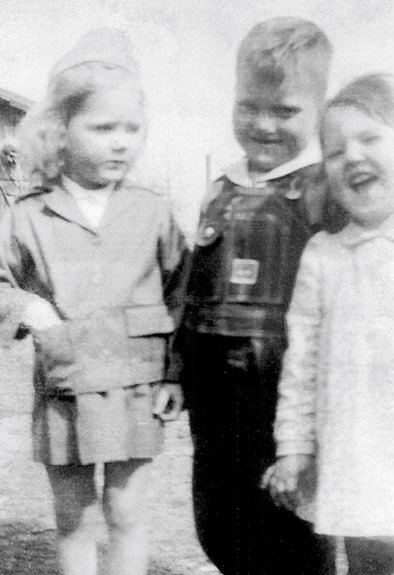
The thing that bothered us the most was sugar and shoes. That is what I heard the most
about. I was rough on shoes and was told I used everybody’s ration. I don’t know how that
could be when I went bare foot most of my life. People couldn’t get tires but that didn’t
affect us because we didn’t have a car. There weren’t any sodas in the coolers at grocery
stores or service stations. Sometime they would have ginger ale (the hot kind). Mother
(Emily Maness) took me and my sister Jo Ann on the bus to New Port News, VA to see Zeb
and Ethel Shuping. In case of an enemy air raid, they had black out shades on the windows
because they were close to ship yards. When the sirens went off no light should be seen
in your house. If they could see light, an air raid officer would knock on the door and tell
you about it. I thought that was a little scary. When the war was over, they closed the cross
roads up town and had a dance and I went. Everybody was so patriotic even the children.
Barbara Maness Dunn
Jo Ann Maness, sister to Barbara, was very young but I remember Daddy, Robert Paige
Maness, carrying me in his arms. We were going up town. All of a sudden people started
running out of stores into the highway, shouting and dancing. We didn’t know what was
happening. Daddy put me down and held my hand till we got up there and found out
the war was over. A lot of the children got military outfits. I had one for the Army and
my friend D.C. Saunders got one for the Navy and his came with a whistle.
